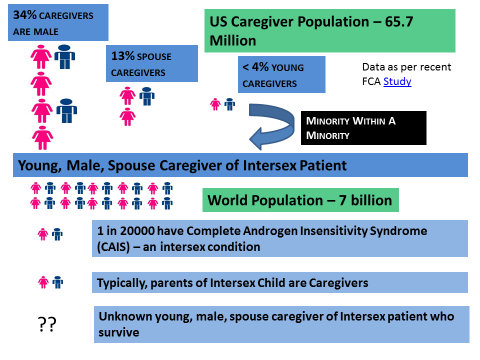Androgen Insensitivity Syndrome (AIS) is a condition that affects sexual development before birth and during puberty. People with this condition are genetically male. They may have female sex characteristics or signs of both male and female sexual development. Caregivers of intersex or AIS patients, a rare condition, are a minority within a minority. Given the secrecy and lying around AIS, the spousal partners of a AIS patient who may be unsuspecting and unknowing. These caregivers are male and tend to be a “role reversal” from the norm. As per a recent survey, there are 65.7 million family caregivers in the USA and 34% of all caregivers are men and the average age is close to 50 and less than 4% are young to middle-aged and less than 13% are spousal caregivers. Thus making a young to middle-aged, male, spousal caregiver a minority within a minority. In addition, the unknowing caregivers of intersex or AIS patients, a rare condition, are a miniscule minority and a highly underserved group. It is hard to find a precedence or any statistics. Does that mean the young, male caregiver should not get support? It seems like it is a crime to become a young, male caregiver due to the severe lack of awareness and support. There is plenty of support and resources available for AIS patients and therefore is not the focus here.
What is so unique about the unknowing caregivers of intersex AIS patients who are their partners, unlike parents or family?
- The AIS patient has resources to get through. Given the secrecy, the unknowing caregiver is shut out from institutional resources citing privacy.
- Hardly anyone to talk to or look for support in the immediate peer group (young, male, spousal caregivers). Finding support is hard.
- Young, spousal caregivers may lose the emotional support and intimacy depending on the patient’s medical condition.
- The young, male, spousal caregiver’s life, career, future plans are at a standstill at a very young age.
- The unknowing caregiver just found out they were lied to and betrayed turning them into patients to deal with their own personal trauma.
- The unknowing caregiver has the burden of making a family including children since AIS patients are infertile.
- The unknowing caregiver has the burden of undoing what several counselors have told to the AIS patient that they cannot be a parent.
- What if due to the traumatic medical condition there is domestic violence or abuse against the young, male, spousal caregiver? What is his protection under law?
- In a twist of irony, despite showing all the sensitivity in silence, the young, male, spousal caregiver is stereotyped as “insensitive” and has to fight against the bias.
Finite Limit To Sustained Trauma By Caregivers
An opinion on Junior Seau‘s cause of death highlighted depression and isolation due to sustained concussions to be the true culprits of him taking his own life. The point is there is a finite limit to trauma a human can endure.
Let us start by providing the needed support to the young, male caregiver one thing at a time. You can review the objectives of the group or sign the petition to offer support. The situation is so unique that there are no support groups till now, no NGOs, no medical intervention groups, no laws, no ‘institutional look the other way doers’ to help him and protect his rights. When one factors in the “stereotypes” where males are considered to be LESS of a caregiver, these specific group of caregivers have an added burden of fighting through the discrimination. There is no one to marshall the resources and work the system to help the caregivers who have undergone this severe trauma in loneliness at a very young age.
Caregivers of intersex or AIS patients need support, especially the ones who were in an unknowing relationship. They do not know how to react. There is no template provided to them on how to digest. There is no prescription for their trauma. The unknowing caregivers are simply reacting with common human decency.
The odds are so small of finding more people like this in the world. This only demands the urgency for their need for support. In fact, they need even more support. The goal is to provide support to all who need it. There is no prescription on how to react when one finds oneself in this situation. Hopefully by sharing the truth, we can get more people aware and provide the much-needed support. Hopefully, we can save one human life of a caregiver and its worth everything.
| Fact | Intersex Patient | Unknowing Caregiver of An Intersex Patient |
|---|---|---|
| Traumatic Condition | Yes | Yes |
| Secrecy | Yes | Yes |
| Stigma | Yes | Yes |
| Protection Under Law Against Domestic Violence | No | No |
| Informed Consent | Yes | No |
| Sex Reassignment Surgery | Yes | Its effects |
| Hormone Replacement Therapy | Yes | Its effects |
| Infertility and Adoption | Yes, most intersex parents opt for adoption but not allowed everywhere. | Barring love, a young male would leave but has to face the same infertility issues if he stays. |
| In vitro Fertilization (IVF) in India | Intersex people are not allowed to opt for surrogacy | Yes but international laws are not equal. |
| Respect | Laws are still forming on this in general for LGBTI | Unknown and stereotype of male gender is used |
| Received Trust | Yes or a loving caregiver would not stay | ?? |
| Love | Yes or a loving caregiver would not stay. Here is a real story from India without family support. | In phases due to treatment |
| Marriage | Laws are still forming on LGBTI marriage equality. | Yes |
| Support Group | Yes | No |






 Facebook
Facebook GooglePlus
GooglePlus RSS
RSS Twitter
Twitter